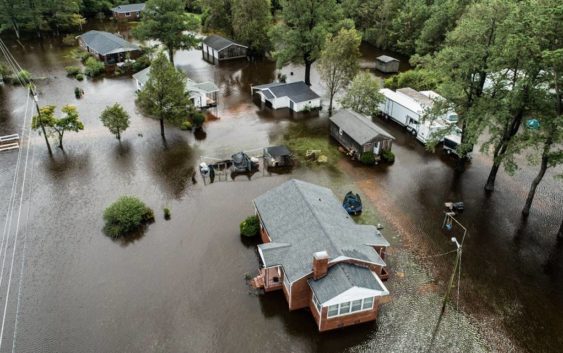- Carolina Hurricanes playoff tickets go on sale next week
- Weather Impact Alert: Cold front could trigger severe weather in Houston area this weekend | See timeline
- Violent storms cut through the South and Midwest, spawning tornadoes and killing 3
- Above-normal active 2025 hurricane season predicted by Colorado State University
- Cold front could trigger severe weather in Houston area this weekend | Timeline for potential storms
After Florence, make aid to NC public schools an everyday priority

The public schools in eastern North Carolina that did not suffer major damage from Hurricane Florence played a central role in the response and recovery in their communities serving as shelters and distribution sites. Florence revealed to our local communities and state a population of vulnerable people that is not unlike what public school teachers see every single day. Florence also revealed years of neglect to the infrastructure in many schools.
As a public school teacher, it saddens me that my larger community and some elected representatives do not genuinely recognize the severity of these exposed circumstances and what they mean for our future. Students and teachers need the support that our communities and elected representatives have shown in our schools since Florence every day of the year. Let’s apply the same sense of urgency for rebuilding that we have had in the wake of Florence to completely re-imagine what is possible in public schools.
North Carolina public schools serve over 1.5 million youth. Whether you have children or know young people in public schools, you are directly impacted by their experience. For this reason, it is important how you, your local government, and your state government supports public education.
In 2014 22 percent of North Carolina children lived in households with food insecurity and 60 percent of the state’s public school students in 2017 received free or reduced price meals. I teach students with mental health conditions, behavioral issues, and unsteady home lives. Some people may think that schools should only focus on academics. While our main measures of success still point to standardized test results, the ways that I serve students daily far exceed the Spanish they learn in my class.
$20 for 365 Days of Unlimited Digital Access
Last chance to take advantage of our best offer of the year! Act now!
#ReadLocal
The flexibility to take smart risks and try innovative approaches to these challenges is typically limited to charter schools and smaller scale experiments in the public realm. While many charter schools are highly successful in reaching their goals, we have yet to explore the untapped potential of public schools which serve the majority of our students. There are some hopeful examples such as the legislation for a “Renewal School System”, which gives charter-like flexibility to the entire Rowan-Salisbury School district. There are also Advanced Teaching Roles being piloted in ten small districts. As a teacher pursuing a doctoral degree for which I will not get paid, this is refreshing to know that we are considering ways to expand opportunities for teacher leaders.
The hurricane season has given us pause to take note of what is most important in our lives and it has also revealed weaknesses in our communities. Whereas Florence had a way of not discriminating who it impacted, sometimes our educational policies do discriminate. Too often, there is unequal distribution of funding, resources, and experience. Such inequities further the marginalization of historically oppressed groups of young people. The strong grip that traditional ways of thinking about schools has on all of us compounds these inequities.
For me, Florence provided a new sense of urgency for the students I learn with everyday. While community volunteers have supported the most vulnerable, our state government has worked across party lines to find funding, make it available for recovery, and to pass calendar flexibility. My hope, and my fellow teachers’ hope, is that such actions become a normal part of our everyday commitment to public education.
The timing for such a sense of urgency could not be more perfect for our recently elected representatives at many levels of government following the midterm elections. We can all look to our collective future and consider the impact and legacy we want to leave. I believe it is essential make significant and daring investments in the schools that serve our students for the benefit of their future. Accepting collective responsibility for the growing needs that public schools are addressing as well as the necessary investments they need benefits all of us.
Kayce Smith is a high school teacher in Brunswick County and a doctoral student in educational leadership at UNC-Wilmngton.